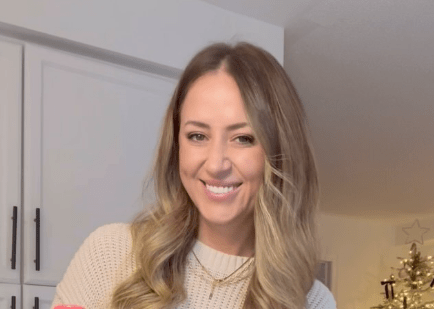Innocence reigns during childhood for the majority of people. A fight for Fallon Farinacci’s life was taking place there. During an eight-hour hostage situation, she witnessed the unfathomable horror of her parents’ murders when she was nine years old. In the years that followed, she would face upheaval, her older brother’s suicide, and the crushing disappointment of seeing how the justice system had let her family down time and time again.

Still, Fallon was not going to accept a tragic ending to her story. Instead, she channeled her suffering into a catalyst for transformation. An unwavering voice in the fight for justice, she has testified at the National Inquiry into Missing and Murdered Indigenous Women and Girls (MMIWG) and advocated for systemic reforms.
Who were the parents of Fallon Farinacci?
A terrible crime was only one of many things that happened to Maurice and Sherry Paul. They had big dreams, were part of a tight-knit Métis community, and were caring parents. Their tragic tale exemplifies the precariousness of human existence and the catastrophic results of institutionalized incompetence.
| Attribute | Details |
|---|---|
| Father | Maurice Paul |
| Mother | Sherry Paul |
| Ethnicity | Métis (Father), Non-Indigenous (Mother) |
| Hometown | St. Eustache, Manitoba, Canada |
| Date of Death | January 27, 1993 |
| Cause of Death | Murder |
| Children | Fallon Farinacci, Younger Brother |
| Legacy | Advocacy for Indigenous justice and awareness of MMIWG |
(Reference: National Inquiry into Missing and Murdered Indigenous Women and Girls) , Instagram
An Unforgettable Evening
The Paul family should have treated January 27, 1993, like any other night. Rather, it turned into a terrifying nightmare that would stay with Fallon always.
An unsettling obsession with Sherry had developed in Andre Ducharme, a longtime friend of Maurice. A few months back, he had made a death threat, saying that they would not make it to their next birthday. Sherry notified the RCMP of the threat, but they did nothing to address it.
On that fateful night, Ducharme broke into their home, kidnapped Fallon’s younger brother, who was seventeen years old, and then proceeded to confront Maurice and Sherry upstairs. A relative who lived nearby heard the teenager’s screams for help and rushed to contact the authorities.
What transpired next was an astonishing demonstration of futility. The situation was supposed to be escalated by a superior officer, but instead, he went back to bed. No one ever came to help for six agonizing hours. Officers arrived at the residence at 8:34 a.m., but by then it was already too late. No sign of Maurice or Sherry. Ducharme had redirected the weapon towards himself.
An Ineffective System—Time and Time Again
For Fallon, surviving the tragedy was only the first step in an uphill struggle. Moving from their Métis community in Manitoba to St. Catharines, Ontario, she and her brother, who was five years old at the time, were uprooted from their cultural heritage. Unsatisfactory mental health assistance was given.
Even though he was the first to flee that terrible night, her older brother never fully recovered from the ordeal. He finally gave in to the overwhelming burden of those memories when he was 29 years old and ended his own life. For a family shattered by neglect and brutality, it was an additional crushing blow.
The legal system showed no emotion whatsoever. The police were not held responsible for the tardy response. Nothing was done to stop future disasters of this kind. There was every rationale for Fallon to give up, but she didn’t.
Transforming Adversity into Strength: Fallon’s Struggle for Fairness
Reliving her trauma in front of the National Inquiry into MMIWG in 2017, Fallon hoped to prevent others from experiencing what she did. Her account illuminated the systemic shortcomings that had befallen her family.
Victims like her waited for help for a long time. No swift action was taken after the inquiry released 213 calls for justice in 2019. Fallon was concerned that reform pledges would stay that: pledges.
After much delay, the Canadian government unveiled a strategy to deal with MMIWG instances in 2021. It was an improvement, albeit a flawed one. By raising awareness and calling for greater accountability, better policing of Indigenous communities, and access to trauma-informed care, Fallon is determined to see that genuine change occurs.
What We Can Learn From Fallon Farinacci’s Story About Adaptability and Perseverance
One thing that Fallon’s story demonstrates is how strong survivors can be. Refusing to allow tragedy define her, she has overcome all odds.
After losing her parents when she was nine years old, she managed to pull herself together.
She managed to stay alive despite the numerous setbacks she encountered with the legal system.
Tragically, her brother lost his life, but she managed to survive.
She managed to withstand the systematic elimination of her Métis heritage.
Plus, she’s still going strong.
For every Indigenous family that has been betrayed by the system, her struggle is a battle for justice. By telling her story, she is making people face ugly realities and demand change.
FAQs About Fallon Farinacci and Her Parents
1. Who were Fallon Farinacci’s parents?
Her parents, Maurice and Sherry Paul, were murdered in 1993 during an eight-hour hostage situation in their Manitoba home.
2. What happened to Fallon’s older brother?
He struggled with trauma for years and died by suicide at the age of 29.
3. Why did Fallon testify at the MMIWG inquiry?
She wanted to expose the systemic failures that contributed to her family’s tragedy and advocate for justice.
4. What changes has Fallon fought for?
She has pushed for better policing in Indigenous communities, improved mental health support for survivors, and greater government accountability.
5. How can people support her cause?
By raising awareness about MMIWG, supporting Indigenous-led initiatives, and demanding action from policymakers.

